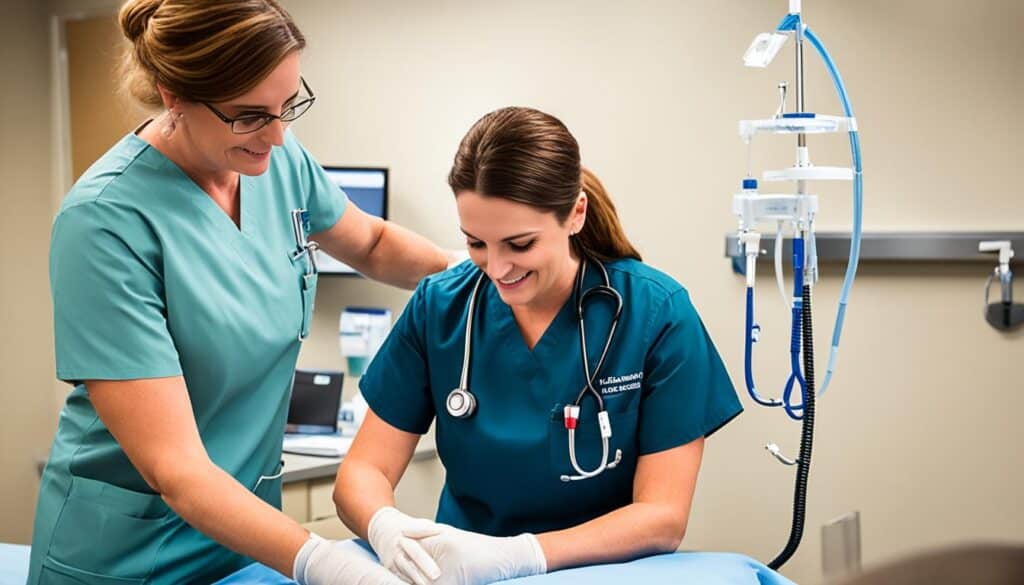Welcome to our comprehensive guide on how to become a medical assistant. If you have the desire to work in the healthcare field and assist in patient care, pursuing a career as a medical assistant may be the right path for you. In this guide, we will explore the education, certification, and career opportunities available to medical assistants. Whether you’re just starting your journey or looking to advance your career, this guide will provide you with valuable insights and information.
Key Takeaways: Become a Medical Assistant
- Becoming a medical assistant opens doors to a rewarding career in the healthcare industry.
- Education and certification are crucial for professional growth and better job prospects.
- There is a strong demand for certified medical assistants in various healthcare settings.
- Developing essential skills such as communication, attention to detail, and empathy can enhance your success as a medical assistant.
- Advancement opportunities, such as specialization or further education, are available for those looking to take their careers to the next level.
Steps to Become a Medical Assistant
Becoming a medical assistant requires a series of steps that will set you on the path to a rewarding career in the healthcare field. From obtaining the necessary education to gaining practical training, these steps will equip you with the skills and knowledge needed to excel as a medical assistant.
Educational Requirements
The first step to becoming a medical assistant is obtaining a high school diploma or GED. This is the minimum educational requirement for entry into a medical assistant program.
Once you have completed high school, it is time to enroll in a medical assistant training program. These programs are offered by vocational schools, community colleges, and online institutions. They provide comprehensive training in medical procedures, patient care, and administrative tasks.
During your training program, you will learn essential skills such as medical terminology, anatomy, and physiology. You will also gain hands-on experience through clinical rotations and internships, where you will work in real healthcare settings under the guidance of experienced professionals.
Exploring Career Opportunities
After completing your training program, you will be ready to enter the workforce as a medical assistant. The demand for medical assistants is increasing rapidly in various healthcare settings, including hospitals, clinics, and physician’s offices.
As a medical assistant, you will have the opportunity to work closely with patients, healthcare providers, and other members of the medical team. You will perform clinical tasks, such as taking vital signs, assisting with examinations, and administering medications. Additionally, you may also be responsible for administrative duties, such as scheduling appointments, managing patient records, and billing.
With experience, you can choose to specialize in a specific area of medical assisting, such as pediatric or geriatric care. Specializing can open up new career opportunities and allow you to focus on the aspects of patient care that interest you the most.
Comparison of Medical Assistant Training Programs
| Program Type | Duration | Cost | Certification Eligibility |
|---|---|---|---|
| Vocational School | 9-12 months | $5,000 – $15,000 | May require additional certification exam |
| Community College | 1-2 years | $10,000 – $25,000 | Eligible to sit for national certification exam |
| Online Program | 6-12 months | $3,000 – $12,000 | Varies – some programs offer certification prep |
It’s important to research and compare different medical assistant training programs to find the one that best suits your needs and career goals. Consider factors such as program duration, cost, accreditation, and certification eligibility.
Becoming a medical assistant requires dedication, hard work, and a passion for helping others. By following the steps outlined above, you can embark on a fulfilling career in the healthcare industry and make a meaningful difference in patients’ lives.
Education and Training for Medical Assistants
To pursue a rewarding career as a medical assistant, it is crucial to obtain the necessary education and training. Medical assistants play a vital role in supporting healthcare professionals, ensuring smooth operations in clinical and administrative settings.
Medical Assistant Training Programs
One of the primary pathways to becoming a medical assistant is by completing a medical assistant training program. These programs provide comprehensive instruction on clinical and administrative skills essential for success in the field. The coursework typically covers topics such as medical terminology, clinical procedures, anatomy, physiology, medical billing and coding, and patient communication.
Medical assistant training programs are offered at vocational schools, community colleges, and universities. It is important to choose an accredited medical assistant program that meets industry standards. Accreditation ensures that the program follows quality guidelines and adheres to curriculum requirements that adequately prepare students for their future roles.
Importance of Clinical Medical Skills
Medical assistants work closely with patients, physicians, and other healthcare professionals. Therefore, it is vital for medical assistants to possess strong clinical skills. These skills include taking medical histories, measuring vital signs, preparing patients for examinations, administering medications, and assisting with minor surgical procedures. Proficiency in clinical tasks ensures that medical assistants provide safe and effective care to patients.
Medical assistants must also be knowledgeable in handling and maintaining medical equipment and supplies. They should understand infection control protocols to ensure a clean and safe clinical environment.
Medical Terminology and Communication Skills
Medical assistants must have a solid understanding of medical terminology. Mastery of medical language enables effective communication with healthcare professionals and accurate documentation of patient information. Understanding medical terms also allows medical assistants to interpret and convey information to patients, ensuring they are well-informed about their health conditions and treatment plans.
In addition to medical terminology, strong communication skills are essential for effective patient interaction. Medical assistants must be able to communicate clearly and empathetically, addressing patient concerns and providing support. Good communication fosters trust, enhances patient experience, and ensures smooth workflow in medical settings.
Consider an Associate Degree in Medical Assisting
While pursuing a medical assistant training program is a common route to enter the field, some individuals may choose to enhance their qualifications by obtaining an associate degree in medical assisting. An associate degree program provides more in-depth education and training, covering advanced topics such as pharmacology, medical ethics, and specialized clinical procedures.
Holding an associate degree can open up additional career opportunities for medical assistants, such as supervisory roles or positions in specialized areas of healthcare.
It’s important to note that while not all medical assistant positions require an associate degree, this additional qualification can enhance job prospects and marketability in the field.
Overall, the education and training for medical assistants are instrumental in developing the skills and knowledge necessary for a successful career. By completing a medical assistant training program, mastering clinical medical skills, acquiring medical terminology proficiency, and considering an associate degree, aspiring medical assistants can ensure they are well-prepared to excel in their roles.
Certification for Medical Assistants
The Importance of Becoming a Certified Medical Assistant
Becoming a certified medical assistant is not only a valuable achievement but also a requirement for many medical assisting positions. Certification demonstrates your competency, professionalism, and commitment to providing high-quality patient care. It enhances your credibility in the healthcare industry and opens doors to more career opportunities.
Requirements for Medical Assistant Certification
To become a certified medical assistant, you must meet the eligibility criteria set by certifying bodies such as the American Association of Medical Assistants (AAMA) or the American Medical Technologists (AMT). The specific requirements may vary, but they typically include:
- Completion of an accredited medical assistant training program
- Successful completion of the medical assistant certification exam
- Continuing education to maintain certification
Learn How to Become a Certified Medical Assistant
To start your journey towards becoming a certified medical assistant, you first need to enroll in a reputable medical assistant program. These programs provide the knowledge and skills necessary to excel in the healthcare setting. During your training, you will learn about medical terminology, clinical procedures, healthcare ethics, and patient communication.
Once you have completed your medical assistant program, you will be prepared to take the medical assistant certification exam. This exam evaluates your understanding of medical assisting principles and ensures that you meet the competency standards set by the certifying body.
Certifying Bodies for Medical Assistants
There are several recognized certifying bodies for medical assistants, including the American Association of Medical Assistants (AAMA) and the American Medical Technologists (AMT). These organizations offer certifications that are widely recognized in the healthcare industry.
The AAMA awards the Certified Medical Assistant (CMA) credential, which is considered the gold standard for medical assistants. This certification requires passing an examination that covers medical knowledge, administrative skills, and clinical competencies.
The AMT offers the Registered Medical Assistant (RMA) credential, which is also highly respected in the field of medical assisting. To obtain this certification, you must pass an examination that assesses your knowledge and skills in areas such as anatomy and physiology, medical office management, and patient care.
Stay Updated and Advance Your Career
As a certified medical assistant, it is important to stay updated on advances in medical practices and technologies. Continuing education is a requirement to maintain your certification, and it also allows you to expand your knowledge and skills. By investing in your professional development, you can pursue advanced certifications, specialize in specific areas of medical assisting, or explore opportunities for career advancement.
Career Opportunities for Medical Assistants
As a medical assistant, you have a wide range of career opportunities waiting for you. From working in medical facilities to assisting doctors in private practices, the demand for qualified medical assistants is on the rise. Let’s explore some of the exciting career paths available to those who complete a medical assisting program.
Work Settings
Medical assistants can find employment in various work settings, including:
- Medical facilities, such as hospitals and clinics
- Doctor’s offices
- Specialty practices, such as dermatology or pediatrics
- Outpatient care centers
Whether you prefer a fast-paced environment in a hospital or a more intimate setting in a small private practice, there are options to suit your career goals.
Specializations in Medical Assisting
Becoming certified as a medical assistant opens up opportunities to specialize in specific areas. Two popular specializations include:
- Medical Billing and Coding: This specialized field focuses on accurately coding medical procedures and diagnoses for insurance billing purposes. It requires a strong attention to detail and knowledge of coding systems.
- Accredited Medical Assistant: This certification indicates that you have met the rigorous standards set by the Accrediting Bureau of Health Education Schools (ABHES) or the Commission on Accreditation of Allied Health Education Programs (CAAHEP). It demonstrates your commitment to professionalism and high-quality patient care.
Advancement Opportunities
Once you become certified as a medical assistant, there are opportunities for advancement and career growth. With additional experience and education, you can pursue roles such as:
Lead Medical Assistant: In this role, you will oversee other medical assistants and ensure the smooth operation of the clinical setting.
Office Manager: This position involves managing administrative tasks, such as scheduling appointments, coordinating patient care, and overseeing medical records.
Specialized Medical Assistant: By gaining expertise in a specific area of medicine, such as cardiology or orthopedics, you can become a valuable asset to healthcare teams.
Many medical assistants also use the experience gained in this role as a stepping stone to further their careers in the medical field. Some pursue higher education and become nurses, physician assistants, or other healthcare professionals.
Image

| Career Path | Median Annual Salary (2020) |
|---|---|
| Medical Assistant in Hospitals | $35,850 |
| Medical Assistant in Physicians’ Offices | $34,380 |
| Medical Assistant in Outpatient Care Centers | $35,740 |
| Medical Billing and Coding Specialist | $44,090 |
| Accredited Medical Assistant | $39,100 |
These figures are the median annual salaries in the United States and can vary based on factors such as location, experience, and specialization.
Job Duties and Responsibilities of Medical Assistants
As a medical assistant, you play a vital role in the healthcare industry. Your responsibilities encompass a wide range of tasks that contribute to the smooth functioning of medical facilities. Whether you work in a hospital, clinic, or doctor’s office, your high school diploma or GED and completion of a medical assisting program will equip you with the necessary skills and knowledge to excel in this role.

Key Duties:
- Taking Medical Histories: One of the primary responsibilities of a medical assistant is to gather information regarding patients’ medical histories. This critical task helps healthcare providers make accurate diagnoses and develop appropriate treatment plans.
- Assisting with Examinations: Medical assistants work closely with healthcare providers to assist during patient examinations. This may involve taking vital signs, preparing exam rooms, and ensuring patient comfort.
- Performing Routine Procedures: Medical assistants are often trained to perform various routine procedures such as taking blood samples, administering injections, or conducting basic laboratory tests. These tasks support physicians in diagnosing and treating patients effectively.
In addition to these core duties, medical assistants may also be responsible for scheduling appointments, managing medical records, and assisting with administrative tasks. The specific responsibilities may vary depending on the healthcare setting and specialization, demonstrating why medical facilities highly value skilled medical assistants.
“Medical assistants are essential members of the healthcare team, providing valuable support to physicians and ensuring the seamless delivery of patient care. Through their dedication and expertise, medical assistants contribute significantly to improving patients’ overall healthcare experience.”
Education and Training:
Completing a medical assisting program is crucial to acquire the necessary knowledge and skills for this role. These programs typically cover courses such as medical terminology, anatomy and physiology, and clinical procedures. Some programs even offer opportunities for hands-on training to strengthen practical skills. Accredited medical assisting programs are available in various educational institutions, providing aspiring medical assistants with a solid foundation for their careers.
While a high school diploma or GED is the minimum educational requirement for medical assistants, some employers may prefer candidates who have completed an associate degree in medical assisting. This higher level of education can open doors to advanced job opportunities and potentially higher salaries.
Training and Certification:
Although medical assistants can start their careers with a high school diploma or GED and complete a medical assisting program, some states may require additional certifications or registrations. The certifications help validate the expertise and competency of medical assistants and assure employers of their qualifications. Certifications, such as those offered by the American Association of Medical Assistants or the American Medical Technologists, demonstrate a commitment to professionalism and continuous learning within the field.
“Becoming certified as a medical assistant not only enhances your credibility but also opens doors to additional job opportunities and career advancement. Employers often prefer hiring certified medical assistants due to their demonstrated expertise in the field, which leads to increased patient satisfaction and improved overall healthcare outcomes.”
Obtaining certification typically involves passing an exam that assesses candidates’ knowledge and skills. The requirements for medical assistant certification may vary, so it’s essential to research the specific certification options available and understand the eligibility criteria and examination process.
Salary and Job Outlook for Medical Assistants
When considering a career in the medical field, it’s important to understand the salary potential and job outlook for medical assistants. The demand for trained and qualified medical assistants has been steadily increasing, making it an attractive profession for those interested in healthcare.
Salaries for medical assistants can vary depending on several factors, including education, certification, experience, and the geographic location. According to the Bureau of Labor Statistics, the median annual wage for medical assistants in May 2020 was $35,850. However, top earners in the field can make upwards of $50,040 per year.
Also Read:- What Opportunities Does Medical Education Offer?
Enrolling in a medical assistant training program and obtaining certification from reputable organizations like the American Medical Technologists or the American Association of Medical Assistants can significantly enhance job prospects and earning potential. Certified medical assistants often command higher salaries and have a competitive edge in the job market.
The job outlook for medical assistants is extremely favorable, with a projected growth rate of 19% from 2019 to 2029, much faster than the average for all occupations. This growth is driven by an increasing emphasis on preventive healthcare and the aging baby boomer population’s need for medical services.
The state of California has the highest employment level for medical assistants, followed by Texas and Florida. These states offer abundant opportunities for individuals looking to enter the field of medical assisting.
Job Outlook by State
Below is a table showcasing the top five states with the highest employment level for medical assistants:
| State | Employment Level |
|---|---|
| California | 100,190 |
| Texas | 73,970 |
| Florida | 73,470 |
| Ohio | 68,690 |
| Pennsylvania | 65,330 |
As seen in the table, the state of California has the highest employment level for medical assistants, offering a multitude of opportunities in various healthcare settings. However, it’s essential to note that the demand for medical assistants is not limited to these states, as medical facilities across the United States require the valuable skills and contributions of medical assistants.

Essential Skills and Qualities for Medical Assistants
To excel in a medical and office career, it is essential to possess a specific set of skills and qualities. These attributes play a vital role in ensuring the efficient delivery of healthcare services and the overall well-being of patients. Whether you are considering a career in the medical field or have already embarked on the path to become a medical assistant, it is crucial to understand the key competencies required for success.
Strong Communication Skills
Effective communication lies at the heart of providing quality patient care. Medical assistants must possess excellent verbal and written communication skills to interact with patients, healthcare professionals, and administrative staff. They must convey information accurately, listen attentively to patient concerns, and explain medical procedures and treatment plans coherently. By maintaining clear and open lines of communication, medical assistants contribute significantly to cultivating a positive and supportive healthcare environment.
Attention to Detail
In a medical setting, even the smallest oversight can have significant consequences. Medical assistants must demonstrate exceptional attention to detail to ensure accurate medical records, precise medication administration, and a seamless flow of information. Meticulously documenting patient information, adhering to laboratory protocols, and carefully following instructions are vital aspects of a medical assistant’s role. By prioritizing accuracy and paying close attention to detail, medical assistants contribute to patient safety and improved healthcare outcomes.
Empathy and Compassion
Medical assistants encounter patients during vulnerable moments in their lives. Demonstrating empathy and compassion is crucial in providing patient-centered care. Medical assistants should exhibit genuine concern for patients’ well-being, treating them with respect and dignity. By actively listening, providing emotional support, and demonstrating empathy, medical assistants help alleviate patient anxiety and establish trust, fostering a positive patient experience.
Professionalism and Adaptability
Working in a fast-paced medical office requires professionalism and adaptability. Medical assistants must maintain a professional demeanor when interacting with patients, colleagues, and healthcare providers. They must adhere to ethical standards, maintain patient confidentiality, and demonstrate a commitment to creating a safe and welcoming environment. Additionally, medical assistants must be adaptable and flexible, as healthcare environments often experience dynamic changes and unexpected situations.
One organization that offers resources and support to medical assistants is the American Medical Certification Association (AMCA). The AMCA provides certification and continuing education opportunities to enhance the professional growth of medical assistants. By considering becoming a medical assistant, you become part of a rewarding career in the medical field, where your skills and qualities contribute to the well-being of patients and the success of healthcare facilities.

Comparison of Key Skills and Qualities for Medical Assistants
| Skills and Qualities | Description |
|---|---|
| Strong Communication Skills | Medical assistants must possess excellent verbal and written communication skills to interact effectively with patients, healthcare professionals, and administrative staff. |
| Attention to Detail | Exceptional attention to detail is vital for accurate documentation, medication administration, and adherence to protocols. |
| Empathy and Compassion | Medical assistants should demonstrate genuine concern, empathy, and compassion for patients, providing emotional support and fostering trust. |
| Professionalism and Adaptability | Professionalism and adaptability are essential qualities for maintaining ethical standards, patient confidentiality, and handling dynamic healthcare environments. |
By possessing these essential skills and qualities, medical assistants are well-equipped to thrive in their roles and make a meaningful impact on patient care. Whether you are considering a career in medical assisting or are already on your journey, cultivating these attributes will contribute to your professional success and the overall enhancement of healthcare delivery.
Advancement Opportunities for Medical Assistants
Once you have completed your accredited medical assisting program and started your career as a medical assistant, you may be wondering about the potential for growth and advancement within the field. Fortunately, there are numerous opportunities for medical assistants to progress in their careers and take on more challenging roles.
If you are interested in becoming a medical assistant, it’s important to understand the different paths and options available to you.
Registered Medical Assistant (RMA)
One of the most common advancement opportunities for medical assistants is to become a Registered Medical Assistant (RMA) through the American Medical Technologists (AMT). This credential demonstrates your commitment to your profession and can open doors to higher-paying positions and increased responsibility. To become an RMA, you must meet the eligibility requirements and pass the certification exam.
Additionally, pursuing additional certifications in specialized areas of medical assisting can further enhance your skills and credentials, making you a valuable asset in the healthcare industry.
Pursuing Further Education
If you are interested in taking your medical assistant career to the next level, pursuing further education in the medical field is an excellent option. There are various degree and certificate programs available that can help you specialize in specific areas of healthcare. For example, you can consider obtaining a degree in nursing, medical laboratory technology, or healthcare administration.
| Advancement Opportunities | Description |
|---|---|
| Become a Registered Medical Assistant (RMA) | Obtain the RMA credential through the American Medical Technologists (AMT) to showcase your expertise and increase job prospects. |
| Pursue Further Education | Consider obtaining a degree or certification in specialized areas such as nursing, medical laboratory technology, or healthcare administration. |
| Specialize in a Clinical Area | Develop expertise in a specific clinical area, such as cardiology, dermatology, or pediatrics, to expand your career opportunities. |
| Transition to Medical Office Management | With experience and additional training, you can explore opportunities in medical office management or healthcare administration. |
Specializing in a Clinical Area
Many medical assistants choose to specialize in a particular clinical area to further advance their careers. By developing expertise in fields such as cardiology, dermatology, or pediatrics, you can expand your job opportunities and seek higher-level positions within these specialized areas.
Transitioning to Medical Office Management
If you have a strong interest in the administrative side of healthcare, transitioning to a role in medical office management or healthcare administration may be the right path for you. With experience and additional training, you can take on leadership roles within medical offices or healthcare facilities, overseeing operations and managing personnel.
Remember, a successful medical assistant career is built not only on education and certifications but also on continuous learning and professional development. Stay updated with the latest advancements in medical assisting, attend conferences and workshops, and seek out networking opportunities to expand your knowledge and expertise.
Keep exploring the various advancement opportunities available to you as a medical assistant, and continue to pursue your passion for providing exceptional patient care.

Conclusion
This comprehensive guide has provided a detailed overview of the steps and requirements to become a successful medical assistant. We have explored the necessary education and certification processes, as well as the essential skills and qualities needed to excel in this profession. By completing a medical assistant certification exam and meeting the requirements for medical assistants, individuals can enter this growing field with confidence.
Medical assistants specialize in providing vital support to healthcare professionals, whether in clinical or administrative settings. They perform a wide range of tasks, from taking medical histories and assisting with examinations to supporting office operations and patient care. This diverse skill set allows medical assistants to play a crucial role in providing quality healthcare.
With the demand for medical assistants projected to grow in the coming years, this is an excellent career choice for those interested in the medical field. By obtaining the necessary education, certification, and experience, individuals can open doors to numerous career opportunities. Whether you choose to specialize in a particular area or pursue further education, a career as a medical assistant offers both stability and advancement potential.
FAQs
Q: What are the requirements to become a medical assistant in California?
A: To become a medical assistant in California, you typically need to complete a medical assisting program from an accredited school and obtain certification.
Q: How can I start a career as a medical assistant?
A: To start a career as a medical assistant, you should consider completing a medical assisting program, obtaining certification, and gaining relevant work experience.
Q: Is it necessary to become certified as a medical assistant?
A: While certification is not always required, becoming certified can enhance your job opportunities and demonstrate your competence as a medical assistant.
Q: What is the process for completing a medical assisting program?
A: To complete a medical assisting program, you will need to attend classes, participate in hands-on training, and pass any required exams or assessments.
Q: How can completing a medical assistant program help in advancing a medical assistant career?
A: Completing a medical assistant program can provide you with the necessary knowledge and skills to succeed in the field and open up opportunities for career advancement.
Q: Are there specific schooling requirements to become a medical assistant?
A: Yes, aspiring medical assistants usually need to enroll in and complete a medical assisting program offered by a vocational school or community college.
Q: What are the benefits of completing a medical assisting certification?
A: Completing a medical assisting certification can validate your expertise, increase your marketability to employers, and potentially lead to higher earning potential.





